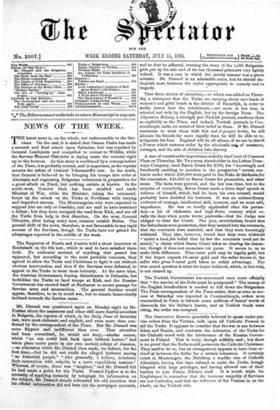A case of considerable importance endediu the Court of Common
Pleas on Thursday. Mr. Twy cross, shareholder in the Lisbon Tram- ways Company, sued Baron Grant for £700, for " knowingly and fraudently omitting to mention in the prospectus" certain eon- tracts under which £20,000 were paid to the Duke de Saldanha for his concession, £45,000 to Baron Grant for promotion, and other sums. The facts were proved, and the law was clear, but to the surprise of everybody, Baron Grant made a three days' speech in defence of himself, which, had he been his own counsel, would probably have doubled his business. It was an extraordinary outburst of courage, intellectual skill, humour, and we must add, impudence. He was so loudly applauded after his perora- tion—a bit of elaborate and high-flown oratory which re- calls the days when poets wrote pastorals—that the Judge was obliged to clear the Court. The jury, nevertheless, found that the defendants were promoters, that they entered into the contracts, that the contracts were material, and that they were knowingly withheld. They also, however, found that they were withheld " under a bond fide belief that by law the contracts need not be stated," a clause which Baron Grant takes as clearing his charac- ter, though it does not exonerate his purse. It seems to us to make little difference. Nine-carat gold may be legally gold, but if the buyer expects 18-carat gold and the seller knows it, the seller who gives 9-carat gold takes an unfair advantage. The true moral question is what the buyer believed, which, in this trial, is not cleared up.






























